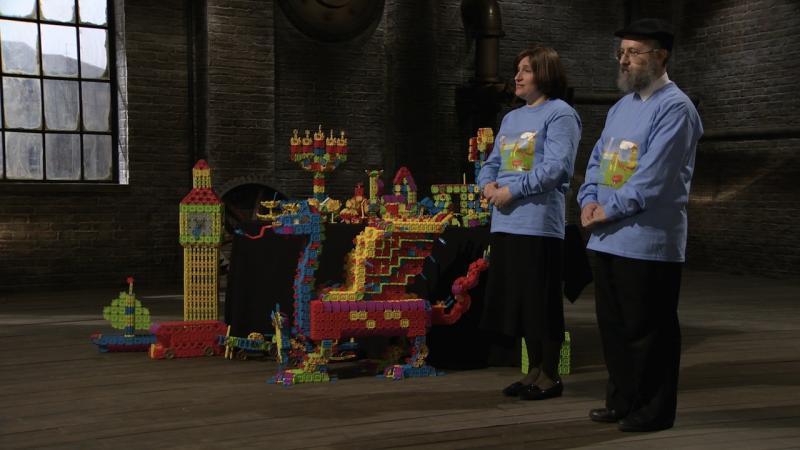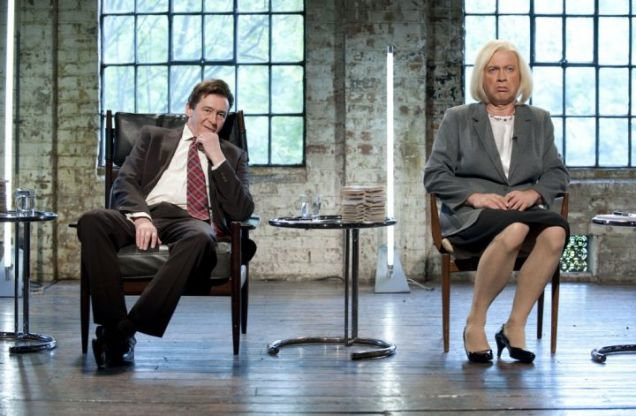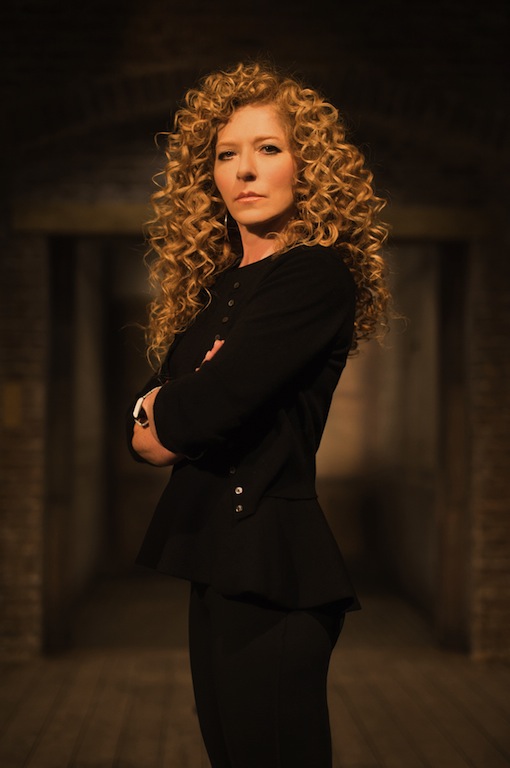Dragons' Den, Series 11, BBC Two | reviews, news & interviews
Dragons' Den, Series 11, BBC Two
Dragons' Den, Series 11, BBC Two
Two new dragons hope to win 100 per cent of our investment

Two new dragons have joined the Dragons’ Den, and it may be even scarier for them than it is for the entrepreneurs. How can pale, uppercrust, celebrity hotel designer Kelly Hoppen possibly match up to our ‘ilary, the trucking queen with the Buzz Lightyear shoulder-pads and the bass-baritone snarl? And how can a faceless cloud-computing bloke supplant Theo, the affable little emperor of high-street bras and waspies?
 Call me cynical, but my acid test is whether Harry Enfield and Paul Whitehouse would bother to guy them alongside Grumpy Woman and Duncan Guillotine (pictured right), or would find, as with James Caan, that they have no discernible character traits.
Call me cynical, but my acid test is whether Harry Enfield and Paul Whitehouse would bother to guy them alongside Grumpy Woman and Duncan Guillotine (pictured right), or would find, as with James Caan, that they have no discernible character traits.
The atmosphere is, as always, trying to be like a murder scene from Wire in the Blood. The applicants are delivered to the den like new-born kittens in an iron lift apparently stained with blood and wee. We’re in yet another warehouse on the demolition list, and the trailer promises us tears, if not actual balls squeezed till they pop.
The comedic element of this reality programme has diminished as life becomes harder. It’s no joke if new enterprises can’t find backing from investors when the banks have rejected them. Since 2005 the various dens have pledged £7 million to back more than 100 small businesses, even if not all have succeeded. Peter Jones and Duncan Bannatyne are still there, eight years on, so it can't be all bad for their pockets.
 In this opening show of the 11th series, candidates pleaded for backing for fake tan, fast food, a complex children’s toy, and two brilliant products the Den producer had to have been doubled over in happiness about: a body-length hotwater bottle in cashmere, trimmed with mother-of-pearl, which is already being sold in Harrods (I think they said), and a luxury golfbag-shaped picnic hamper on wheels. The last two have a pleasing aura of being produced by aliens strayed in from Cameron-land: let’s make a £200 hotty for rich folks who don’t have an electric blanket, and here's a nice accessory for a shooting party.
In this opening show of the 11th series, candidates pleaded for backing for fake tan, fast food, a complex children’s toy, and two brilliant products the Den producer had to have been doubled over in happiness about: a body-length hotwater bottle in cashmere, trimmed with mother-of-pearl, which is already being sold in Harrods (I think they said), and a luxury golfbag-shaped picnic hamper on wheels. The last two have a pleasing aura of being produced by aliens strayed in from Cameron-land: let’s make a £200 hotty for rich folks who don’t have an electric blanket, and here's a nice accessory for a shooting party.
Kelly Hoppen (left), who knows the luxury scene backwards, inquired how much room there was actually inside the golfbag picnic hamper for, you know, actual food. She was assured that you could get celeriac mash and game curry quite easily in there in a thin Tupperware. Plus, obviously, a bottle of Bolly. And, the maker added as an afterthought, the Kuwaiti royal family had bought 50 already.
The dragons seemed dumbfounded by its maverick eliteness. Great margins, but not, sadly, a big enough market if it's just royal families. Instead they battled tooth and nail to invest in high-street fake tan and colourless, gluten-free, taste-free gym food. Don’t try to be too clever, was the message. Pile ‘em high, sell ‘em cheap.
When the elephant sits down, get out of his way
There are, if you’re watching with your glasses on, good lessons about business. The clever construction toy created by a doughty couple with 12 children hit the wall of what the IT man called the Big Rule: “When an elephant sits down, get out of his way.” This meant: you’re up against Lego. When David went out against Goliath, NB it was only a real giant, not a multinational corporation with 75 percent of the world building-toy market.
Kelly, the brand-maker, came out of her slightly not-a-real-business persona by asking the couple why, if they had 1,000 packs of this fantastic toy in their garage, they hadn’t gone out and sold them before coming to the dragons to ask for money to expand into a wider range. Were they ducking out of the selling? You suddenly understood that brands, too, have actual budgets, actual projections, actual people flogging and needing deals. It still felt unfair on the Fogels, though.
 The faceless IT man - ok, let him have a name, Piers Linney (right) - earned his mean stripes facing down an impressive pair of men with a world fast-food idea that’s already a whiz success, but still they wanted half a million quid from dragons to replace their kitchen. “That’s what banks are for,” he said sharply.
The faceless IT man - ok, let him have a name, Piers Linney (right) - earned his mean stripes facing down an impressive pair of men with a world fast-food idea that’s already a whiz success, but still they wanted half a million quid from dragons to replace their kitchen. “That’s what banks are for,” he said sharply.
Sob stories abounded. The fast-food man was only 30 but looked 40 because he’d been working 100-hour weeks for the past three years and had lost his hair to alopecia. How unfair it seemed that instead it was the man with no charisma selling the grey pot-noodles that have no calories and no taste who scooped up all five dragons in a bidding war after breaking down pathetically in tears about his fantastic wife. I know which food I’d rather eat. But he was only asking for a tenth of the money. In the dragony world, he was cheap and he was weak but he had a great brand. Dragons' Den is a great brand but I hope these new dragons can do better than that, or it will all become very depressing.
Overleaf: watch a Harry and Paul Dragons' Den sketch
rating
Explore topics
Share this article
The future of Arts Journalism
You can stop theartsdesk.com closing!
We urgently need financing to survive. Our fundraising drive has thus far raised £49,000 but we need to reach £100,000 or we will be forced to close. Please contribute here: https://gofund.me/c3f6033d
And if you can forward this information to anyone who might assist, we’d be grateful.

Subscribe to theartsdesk.com
Thank you for continuing to read our work on theartsdesk.com. For unlimited access to every article in its entirety, including our archive of more than 15,000 pieces, we're asking for £5 per month or £40 per year. We feel it's a very good deal, and hope you do too.
To take a subscription now simply click here.
And if you're looking for that extra gift for a friend or family member, why not treat them to a theartsdesk.com gift subscription?
more TV
 Murder Before Evensong, Acorn TV review - death comes to the picturesque village of Champton
The Rev Richard Coles's sleuthing cleric hits the screen
Murder Before Evensong, Acorn TV review - death comes to the picturesque village of Champton
The Rev Richard Coles's sleuthing cleric hits the screen
 Black Rabbit, Netflix review - grime and punishment in New York City
Jude Law and Jason Bateman tread the thin line between love and hate
Black Rabbit, Netflix review - grime and punishment in New York City
Jude Law and Jason Bateman tread the thin line between love and hate
 The Hack, ITV review - plodding anatomy of twin UK scandals
Jack Thorne's skill can't disguise the bagginess of his double-headed material
The Hack, ITV review - plodding anatomy of twin UK scandals
Jack Thorne's skill can't disguise the bagginess of his double-headed material
 Slow Horses, Series 5, Apple TV+ review - terror, trauma and impeccable comic timing
Jackson Lamb's band of MI5 misfits continues to fascinate and amuse
Slow Horses, Series 5, Apple TV+ review - terror, trauma and impeccable comic timing
Jackson Lamb's band of MI5 misfits continues to fascinate and amuse
 Coldwater, ITV1 review - horror and black comedy in the Highlands
Superb cast lights up David Ireland's cunning thriller
Coldwater, ITV1 review - horror and black comedy in the Highlands
Superb cast lights up David Ireland's cunning thriller
 Blu-ray: The Sweeney - Series One
Influential and entertaining 1970s police drama, handsomely restored
Blu-ray: The Sweeney - Series One
Influential and entertaining 1970s police drama, handsomely restored
 I Fought the Law, ITVX review - how an 800-year-old law was challenged and changed
Sheridan Smith's raw performance dominates ITV's new docudrama about injustice
I Fought the Law, ITVX review - how an 800-year-old law was challenged and changed
Sheridan Smith's raw performance dominates ITV's new docudrama about injustice
 The Paper, Sky Max review - a spinoff of the US Office worth waiting 20 years for
Perfectly judged recycling of the original's key elements, with a star turn at its heart
The Paper, Sky Max review - a spinoff of the US Office worth waiting 20 years for
Perfectly judged recycling of the original's key elements, with a star turn at its heart
 The Guest, BBC One review - be careful what you wish for
A terrific Eve Myles stars in addictive Welsh mystery
The Guest, BBC One review - be careful what you wish for
A terrific Eve Myles stars in addictive Welsh mystery
 theartsdesk Q&A: Suranne Jones on 'Hostage', power pants and politics
The star and producer talks about taking on the role of Prime Minister, wearing high heels and living in the public eye
theartsdesk Q&A: Suranne Jones on 'Hostage', power pants and politics
The star and producer talks about taking on the role of Prime Minister, wearing high heels and living in the public eye
 King & Conqueror, BBC One review - not many kicks in 1066
Turgid medieval drama leaves viewers in the dark
King & Conqueror, BBC One review - not many kicks in 1066
Turgid medieval drama leaves viewers in the dark
 Hostage, Netflix review - entente not-too-cordiale
Suranne Jones and Julie Delpy cross swords in confused political drama
Hostage, Netflix review - entente not-too-cordiale
Suranne Jones and Julie Delpy cross swords in confused political drama

Add comment